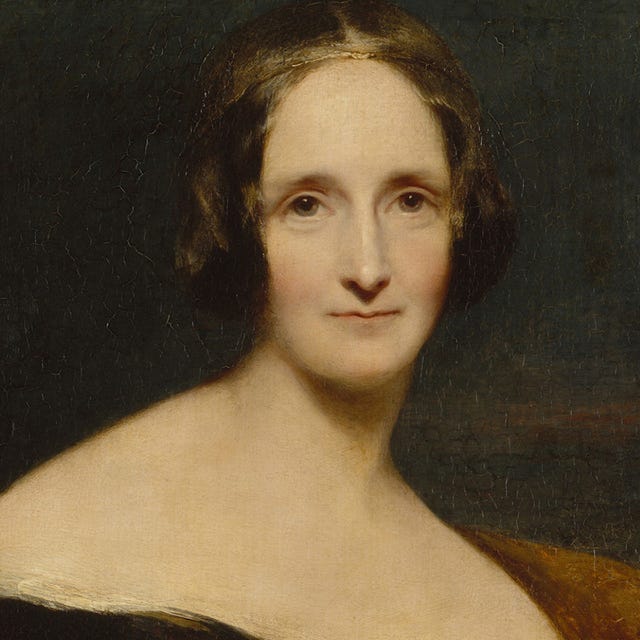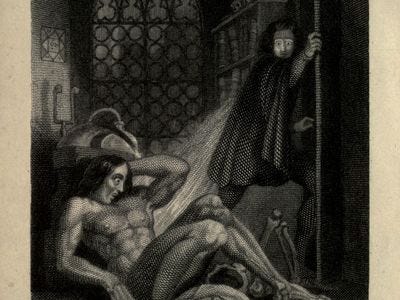Mary Shelley, daughter of writers, was of course a reader. She read John Milton’s Paradise Lost as a very young woman, one might say, a girl. I, too, read all 12 books, all 10,000 lines, all 80,000 words of Paradise Lost as a young woman in a semester long study of the epic poem, which Milton, blind by then, spoke aloud to his daughters and his assistants most mornings, after composing them (it is said) all night long in his head. This is how I write. I compose all night and all day and the next night and the next day in my head and then I write it down. But never in iambic pentameter, and maybe also never tackling something so seminal and so lastingly sound.
My final exam for Milton required near constant review of the text. Our professor would be providing us with selected quotes and we would be expected to identify the book, speaker, context, and import. The cast is divided into three realms. The realm of heaven for God and his loyal angels, the realm of hell for Satan and his fellow fallen angels, and Earth (or Paradise) inhabited by Eve and by Adam. If I studied the book deeply, surely I could recall who could possibly have said what to whom and what it all means. I did well on the exam and promptly stopped thinking about Milton beyond his writing blind.
I am preparing a unit on Frankenstein. I will go very slowly and be with this book for months with my students, in the old way. In preparation, I am reading things, viewing things, listening to things, and taking scrawling frantic notes I am not likely to look at. I listened to an excellent reading of the introduction to the Penguin Classic edition while sitting in an infrared sauna with a notebook, a good pen, and fogging glasses. It was my second of three listens. ( I hope you expect this kind of discipline and ardor from your children’s teachers, we all deserve to learn from enthusiastic scholars.) There were a few lines I was hoping to catch before my printed copy of that edition arrived ( I have given all my books away and so my annotated copies are, too, lost to me). One was a passage of two stanzas by Samuel Taylor Coleridge (whom I also studied at university), from Ancient Mariner, which reportedly terrified Mary’s (radical? tragic? controversial?) young poet-philosopher husband, Percy Bysshe Shelley, who had real cause to be afraid of what shadows lurked behind him (as he abandoned his first wife, whom he betrothed when she was 16 to his 19, four years later for Mary who was then 16 herself, and who would drown herself at the age of 21 leaving their two children to her parents who fought in the courts to keep them from their reprehensible albeit wildly talented father).
Don’t you want to know these things? I do. And I want to read key passages aloud and spend time with them.
Here are the words that frightened Percy, which Coleridge himself insisted Mary be allowed to hear in the salon of smart people gathered around her father (her mother died when Mary was an infant and this will keep mattering in the way that being motherless always matters).
“Like one, that on a lonesome road / Doth walk in fear and dread / And, having once turned round, walks on / And turns no more his head / Because he knows a frightful fiend / Doth close behind him tread” (Penguin Popular Classic 1968 page 57, cited from Rime, 1817 edition).
Mary would give these words to her title character Viktor Frankenstein. He, of course, had every reason to dread a frightful fiend, as he had created, and then rejected, and then abandoned, the one we mistakenly call the monster, as opposed to the creature.
The creature who, like Adam, like me, asks, Did I request thee Maker, from my clay to mold me man? Did I solicit thee from darkness to promote me? (Paradise Lost).
Here are Shelley’s words.
“Cursed, cursed creator! Why did I live? Why, in that instant, did I not extinguish the spark of existence which you had so wantonly bestowed? I know not; despair had not yet taken possession of me; my feelings were those of rage and revenge.” Frankenstein 1818 edition, Vol. II, Ch. 2
My text inbox is often full of such exclamations.
I know more than one beloved and wretched soul who cries aloud to God and me, Why are we even here at all? What is this game? Was I made to merely suffer in this realm where I often cannot distinguish Earth from paradise or hell?
I know more than one person as of this writing who would take their own life if they were not scared to do it.
But they reach out instead, to those who understand, like I do, how baffling it can be to try to be happy while we know the specters of evil lurk at our very backs.
Mary Shelley’s life was rife with dark and crushing losses. She was surrounded by atheists and then she was alone.
Dr. Frankenstein is a Christian. The creature develops a moral compass through observation and reasoning. Mary was sure she would join her husband (who would also drown) and her three babies (only her one son survived to adulthood) in the afterlife.
My medicine is, and always has been, books. To consume and to administer.
Her book is worth your attention.
I will keep writing about it as I make my way back through.





Hi! I will be following your posts as I try to read Frankenstein myself. Encyclopedia Brittanica says Mary Shelley was born August 30, 1797, London, England—died February 1, 1851, London, so couldn't have been 21 when she died.